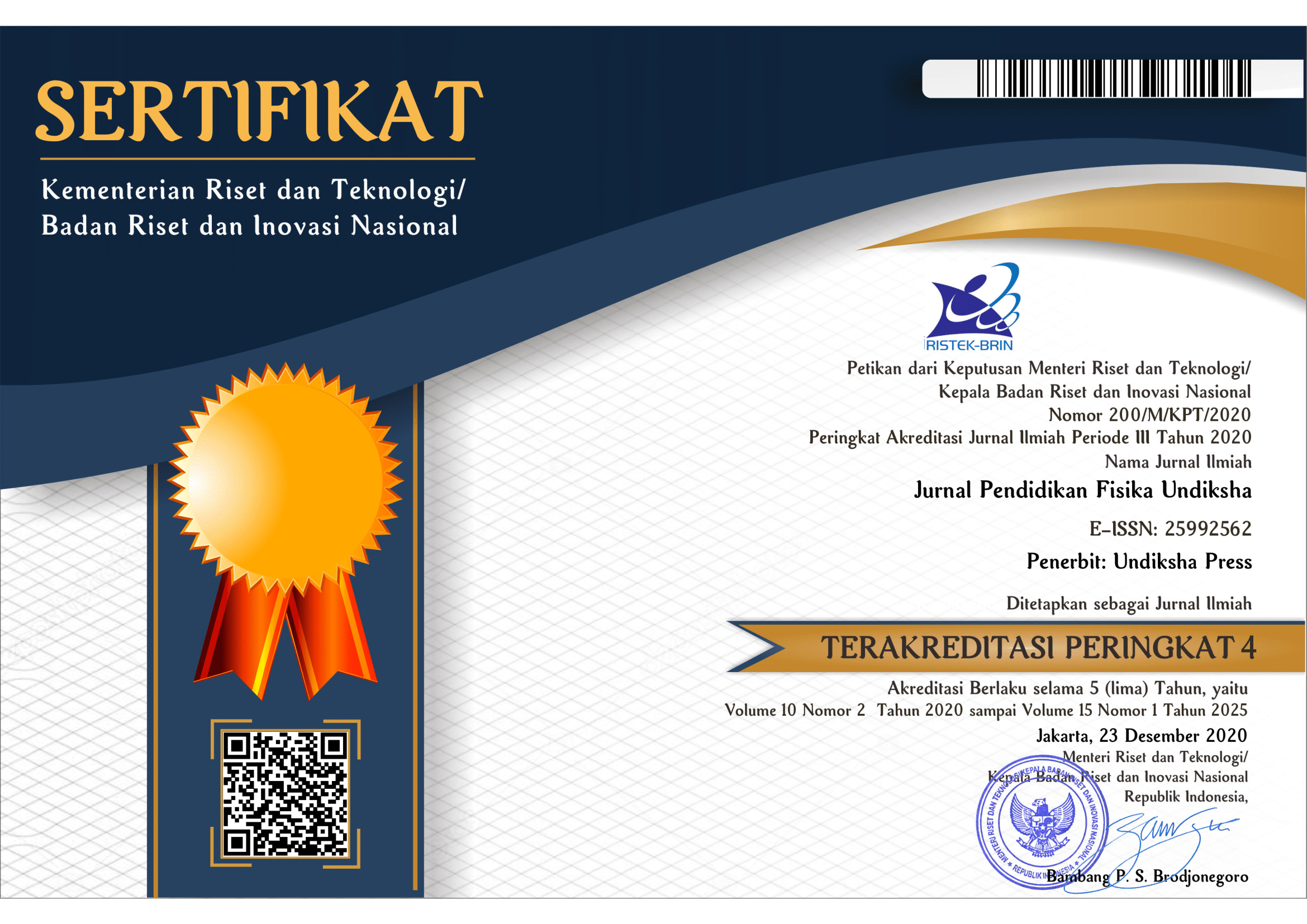THE EFFECT OF COLLABORATIVE CONCEPT MAPPING LEARNING STRATEGY TOWARDS THE STUDENTS CONCEPTUAL UNDERSTANDING OF PHYSICS
DOI:
https://doi.org/10.23887/jjpf.v1i1.3500Abstract
Penelitian ini bertujuan untuk mendeskripsikan perbedaan pemahaman konsep fisika antara kelompok siswa yang belajar dengan menggunakan strategi pembelajaran collaborative concept mapping (SCCM), kelompok siswa yang belajar dengan menggunakan strategi pembelajaran peta konsep (SCM), dan kelompok siswa yang belajar dengan menggunakan strategi pembelajaran sekspositori (SPE). Jenis penelitian ini adalah penelitian eksperimental semu (quasi eksperiment) dengan desain pretest-posttest nonequivalent control group design. Populasi dalam penelitian ini adalah seluruh siswa kelas XI IA di SMA Negeri 1 Singaraja Tahun Ajaran 2013/2014 dengan jumlah total 237 siswa. Sampel ditentukan dengan teknik simple random sampling. Data dianalisis menggunakan statistik deskriptif, ANAKOVA, dan uji LSD. Hasil penelitian menunjukkan bahwa terdapat perbedaan pemahaman konsep antara siswa yang belajar dengan menggunakan SCCM, SCM, dan SPE (F = 14,946; p<0,05). Pemahaman konsep siswa yang belajar dengan menggunakan SCCM berada pada kualifikasi cukup (M = 58,07; SD = 8,25), yang belajar dengan menggunakan SCM berada pada kualifikasi rendah (M = 54,80; SD = 8,86), dan yang belajar dengan menggunakan SPE berada pada kualifikasi rendah (M = 45,33; SD = 7,38). Hasil tindak lanjut uji LSD menunjukkan bahwa rata-rata pemahaman konsep fisika kelompok SCCM secara signifikan lebih tinggi dari kelompok SCM ( ; Δµ= 5,958), rata-rata pemahaman konsep fisika kelompok SCCM secara signifikan lebih tinggi dari kelompok SPE ( ; Δµ= 11,325), dan rata-rata pemahaman konsep fisika kelompok SCM secara signifikan lebih tinggi dari kelompok SPE ( ; Δµ= 5,367).Kata Kunci : Collaborative Concept Mapping (CCM), Strategi Peta Konsep, Pemahaman Konsep Fisika
This study aimed at describing the difference of conceptual understanding of physics between group of students who learned with collaborative concept mapping learning strategy (CCM), group of students who learned with concept mapping strategy (CM), and group of students who learned with expository learning strategy (ELS). This study was quasi-experimental study with pretest–posttest non-equivalent control group design. The population of this study was all students in eleventh grade of mathematics and natural science program (237 students) of SMAN 1 Singaraja in academic year 2013/2014. Samples were determined by using the simple random sampling technique. The data of this study were analyzed by using descriptive statistic, ANACOVA, and LSD test. The result shows that there is a difference of conceptual understanding of physics between group of students who learned with collaborative concept mapping learning strategy (CCM), group of students who learned with concept mapping strategy (CM), and group of students who learned with expository learning strategy (ELS) (F = 14,946; p<0,05). The conceptual understanding of students who have used collaborative concept mapping is in sufficient category (M = 58,07; SD = 8,25), for those who learned with concept mapping strategy achieved the score of conceptual understanding in low category (M = 54,80; SD = 8,86), and for those who learned with expository learning strategy achieved the score of conceptual understanding in low category as well (M = 45,33; SD = 7,38). The advanced testing of LSD showed that the student’s conceptual understanding in group of CCM is significantly higher than the group of CM ( ; Δµ= 5,958), the student’s conceptual understanding in group of CCM is significantly higher than the group of ELS ( ; Δµ= 11,325), and the student’s conceptual understanding in group of CM is significantly higher than the group of ELS ( ; Δµ= 5,367).
keyword : Collaborative Concept Mapping (CCM), Concept Mapping Strategy, Conceptual Understanding of Physics
Published
2014-07-16
Issue
Section
Articles
License

Jurnal Pendidikan Fisika Undiksha is licensed under a Creative Commons Attribution-ShareAlike 4.0 International License.






